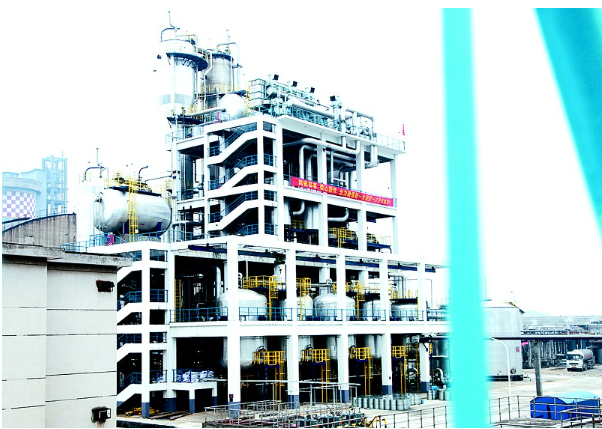Hydrogen Peroxide industrial process
As a Hydrogen Peroxide Production Plant, there is some information to share with you. Hydrogen peroxide, chemical formula H2O2. Pure hydrogen peroxide is a light blue viscous liquid that is miscible with water in any proportion. It is a strong oxidant. The aqueous solution is commonly called hydrogen peroxide and is a colorless transparent liquid. Its aqueous solution is suitable for medical wound disinfection and environmental disinfection and food disinfection. Under normal circumstances, it will slowly decompose into water and oxygen, but the decomposition rate is extremely slow, and the speed of the reaction is accelerated by adding a catalyst such as manganese dioxide or the like, or irradiating with short-wave radiation. Oxidation and reduction in different cases. Used for photographic decontaminants; color positive blue thinning; film over-scale thinning. Very easy to break down, not easy to live for a long time.
Fixed Bed Hydrogen Peroxide Processes
Alkaline hydrogen peroxide production method: a krypton-containing air electrode for producing alkaline hydrogen peroxide, characterized in that each pair of electrodes is composed of an anode plate, a plastic mesh, a cation membrane and a krypton-containing air cathode, at the upper and lower ends of the electrode working area There is a distribution chamber for entering the fluid and a collection chamber for discharging the fluid, and an orifice is arranged at the fluid inlet, and the multi-component electrode adopts a limited dipole series connection method to lengthen the plastic soft for the anode to circulate the alkali water into and out. After the tube is connected to the liquid collecting manifold, the multi-component electrode group is assembled by the unit plate. Our company can also carry Fixed Bed Hydrogen Peroxide Processes.
Phosphoric acid neutralization method: characterized in that it is prepared from an aqueous solution of sodium peroxide by the following steps:
(1) The sodium hydroxide solution is neutralized to a pH of 8.0 to 8.7 with phosphoric acid or sodium dihydrogen phosphate NaH2PO4 to form an aqueous solution of NaH2PO4 and H2O2.
(2) The aqueous solution of Na2HPO4 and H2O2 was cooled to +5 to -5 °C to precipitate most of NaH2PO4 as NaH2PO4.110H2O hydrate.
(3) A mixture containing NaH2PO4·10H2O hydrate and an aqueous hydrogen peroxide solution was separated in a centrifugal separator to separate NaH2PO4·110H2O crystals from a small amount of NaH2PO4 and an aqueous hydrogen peroxide solution.
(4) The aqueous solution containing a small amount of NaH2PO4 and hydrogen peroxide was evaporated in an evaporator to obtain a vapor containing H2O2 and H2O, and a concentrated salt solution of NaH2PO4 containing hydrogen peroxide was discharged from the bottom and returned to the neutralization tank.
(5) The steam containing H2O2 and H2O is subjected to fractional distillation under reduced pressure to obtain about 30% H2O2 product.
Electrolytic sulfuric acid method: electrolysis of 60% sulfuric acid to obtain peroxodisulfuric acid, followed by hydrolysis to obtain a concentration of 95% hydrogen peroxide. 2-Ethyl oxime method: The main method of industrial scale production is the 2-ethyl hydrazine (EAQ) method. 2-ethyl hydrazine reacts with hydrogen under a catalyst at a certain temperature to form 2-ethylhydroquinone. 2-ethylhydroquinone undergoes redox reaction with oxygen at a certain temperature, 2-ethylhydrogen The hydrazine is reduced to form 2-ethyl hydrazine and hydrogen peroxide is formed at the same time, and then an aqueous solution of hydrogen peroxide is obtained by extraction. Finally, a purified aqueous solution of hydrogen peroxide is obtained by purification of heavy aromatic hydrocarbons, commonly known as hydrogen peroxide. This process is mostly used to prepare 27.5%. Hydrogen peroxide, a higher concentration aqueous hydrogen peroxide solution (such as 35%, 50% hydrogen peroxide) can be obtained by Distillation Technology.

评论
发表评论